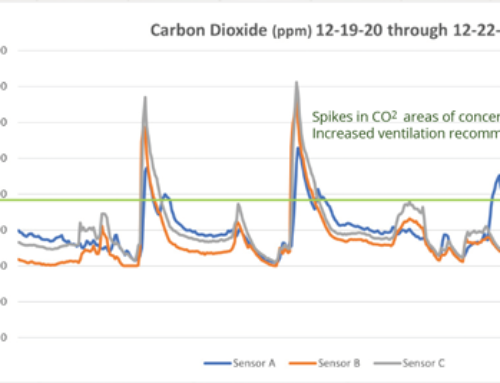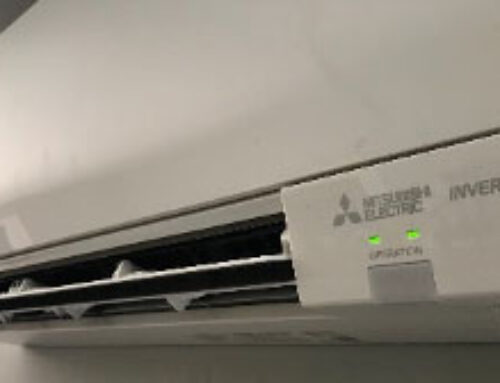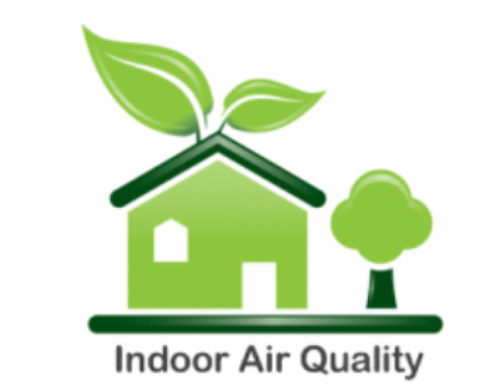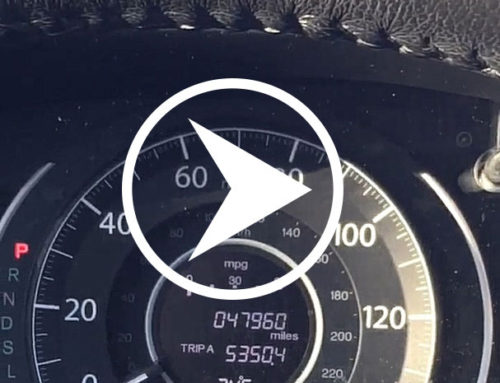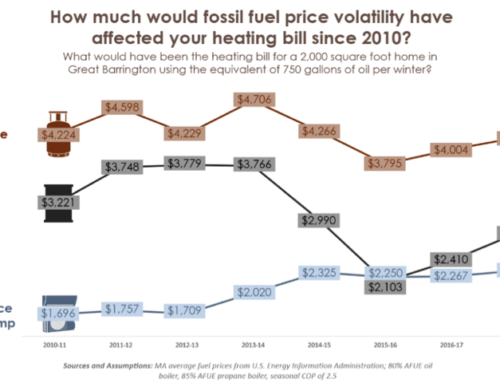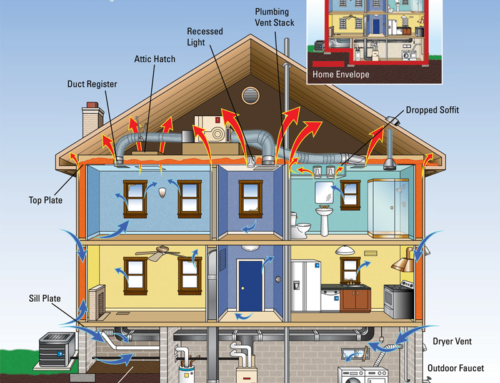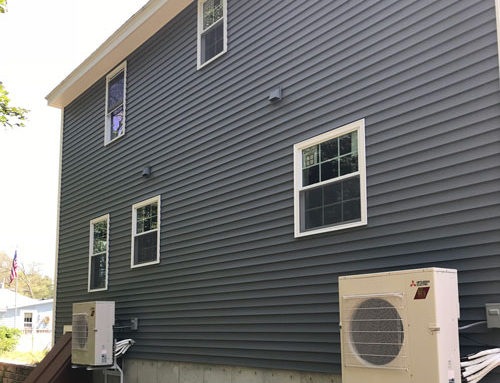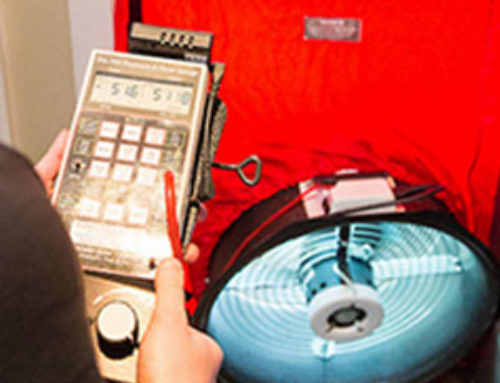Air Tights News | Winter Edition | February, 2020
MA Incentive Programs Support Whole Home Systems Approach
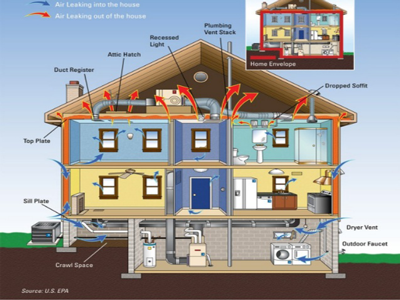 For the last several decades and continuing today many homeowners (and builders) think of homes as a compilation of separate parts.
For the last several decades and continuing today many homeowners (and builders) think of homes as a compilation of separate parts.
In recent years, with the arrival of performance-based energy codes, we have taken on the “house as a system” perspective more and more. This is based on sound building science and should result in achieving better comfort at a lower cost.
Massachusetts is an ideal laboratory to work in when looking at homes as interdependent parts. We have the full range of weather conditions from hot summer days to cold winters with fall and spring seasons that require low-to-moderate amounts heating and cooling as well. And in MA, we have a performance-based code with an array of incentives and rebates to drive smart new construction and renovations projects.
One of the biggest “disconnects” in the home building is between the building enclosure or “envelope” and the mechanicals, mainly the heating and cooling systems. Historically, heating equipment has been grossly oversized by Heating Ventilating and Air Conditioning (HVAC) contractors because they just use only a square footage rule-of-thumb method. This has resulted in a lot of uncomfortable homes because it ignores the building enclosure entirely.
Old homes have always had heat supply along exterior walls because it compensates for poor insulation and leaky homes. If the exterior walls are poorly insulated and leaky, the installation of air source heat pump systems may still leave the occupant uncomfortable because the heat source may not be located at the floor level of an exterior wall. Thus, it is often best with older homes to insulate walls and air-seal walls before sizing and installing new heat pumps. We know now that heating and cooling can be supplied from any wall within a home if the exterior walls are well insulated and airtight.
Installing new heating and cooling equipment should always include a heating and cooling load calculation (Manual J) that includes the building enclosure R-values and air leakage. Properly sized heating and cooling systems make for comfortable living space in all weather conditions.
Thus, incentive programs in MA smartly support the whole-home approach which typically starts with an audit to prioritize measures that complement each other. When new heating and cooling systems such as high-efficiency heat pumps are installed, insulation and air sealing often are best to maximize the incentive or rebate amount. The whole home systems approach produces far more comfortable and cost-efficient places in which to live.
Financial Incentives and Rebates Update
As we start 2020 all rebate and incentive programs that were in place last year are continuing. However, there are some changes summarized below.
Federal Tax Credit 45L Extension
The Federal Government recently passed an extension of the 45L Residential Tax Credit 2018, 2019 and 2020. You may be able to claim the 45L Tax Credit retroactively thanks to the New Home Energy Efficiency Act. The House signed the bill and the Senate has approved for the 45L tax credits to be allowable retroactively for projects placed in service from 1/1/2018 – 12/31/2020. Taxpayers can now amend their 2018 tax return and apply the $2,000 45L credits to their 2018 tax year, or in some situations file a Form 3115 with their 2019 tax return claiming the credits in the current year
Background on 45L
The 45L Tax Credit is an energy-efficient tax credit for residential properties. The tax credit is $2,000 per home to the builders and developers of energy-efficient buildings. Qualifying properties include: Apartments, Condos, Townhouses, and Single-family Homes. All eligible properties must be three stories or lower and must incorporate energy-efficient features such as roofing, windows, doors or HVAC systems.
Links: Program Details | Program Details
If Ace Energy Services has done a HERS rating for you or your company in the last two years, contact us and we can tell you if each and all the homes you built qualify for the credit. We can provide you with a report which you can submit to the IRS to take advantage of this substantial credit.
Mass Save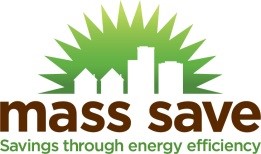
Mass Save – Renovations and Additions Program
The R&A major utilities program sponsors are showing a commitment to improving this program in 2020 to make it work better. One improvement is the that energy model, used to create a before-and-after energy consumption comparison, continues to be upgraded to more accurately measure energy savings in a wider range of applications.
In general, when considering the R&A program, it is best to increase energy savings in the existing home with air sealing, insulation, and high-efficiency mechanicals while making sure that an addition exceeds code standards as much as possible. Achieving these two goals will contribute significantly to maximizing the rebate amount.
Most residential renovation and addition projects at single-family and multi-family homes with three stories or less are eligible if they are located within Program Sponsor service territories. Whether you are a builder or homeowner, its best to start by calling 1-800-628-8413 or email RenovateAddMA@icf.com. HERS Raters are required for participation and can be very helpful in maximizing the rebate amount.
MA DOER
The MA DOER has two programs running that are state-wide and apply in municipalities that do not have gas or electricity from a major utility company.
MA DOER – Home MVP
The Home Energy Market Value Performance (Home MVP) Program. Home MVP offers incentives to help all Massachusetts residents reduce their home energy use, energy bills, and improve home comfort and performance. Link: https://www.mass.gov/guides/home-mvp.
The Home MVP runs through November of 2020 and is likely to extend another year. This program is intended to help in areas that are not Mass Save eligible and in communities that have only municipal utilities companies. Rebate amounts are substantial particularly when a combination of upgrades is combined such as heating/cooling systems along with air-sealing and adding insulation.
MA DOER – Alternative Energy Credits (AECs)
The purpose of the AEC’s is to provide an incentive for installing eligible alternative energy systems, which are not necessarily renewable, but contribute to the Commonwealth’s clean energy goals.
Eligible APS Renewable Thermal technologies include: Air Source Heat Pumps Systems, Ground Source Heat Pumps Systems, Thermal Solar Systems, Woody Biomass Systems, and Liquid Biofuel Systems. Eligibility requirements are listed at the MA DOER website.
Rebate amounts are market based and can change. Nevertheless, this is a very worthwhile rebate in which to apply.
MA CEC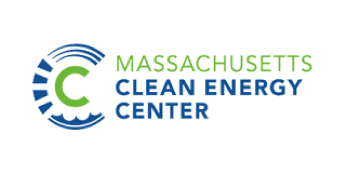
The MA DOER has two programs running that are state-wide and apply in municipalities that do not have gas or electricity from a major utility company.
MA DOER – Home MVP
The Home Energy Market Value Performance (Home MVP) Program. Home MVP offers incentives to help all Massachusetts residents reduce their home energy use, energy bills, and improve home comfort and performance. Link: https://www.mass.gov/guides/home-mvp.
The Home MVP runs through November of 2020 and is likely to extend another year. This program is intended to help in areas that are not Mass Save eligible and in communities that have only municipal utilities companies. Rebate amounts are substantial particularly when a combination of upgrades is combined such as heating/cooling systems along with air-sealing and adding insulation.
MA DOER – Alternative Energy Credits (AECs)
The purpose of the AEC’s is to provide an incentive for installing eligible alternative energy systems, which are not necessarily renewable, but contribute to the Commonwealth’s clean energy goals.
Eligible APS Renewable Thermal technologies include: Air Source Heat Pumps Systems, Ground Source Heat Pumps Systems, Thermal Solar Systems, Woody Biomass Systems, and Liquid Biofuel Systems. Eligibility requirements are listed at the MA DOER website.
Rebate amounts are market based and can change. Nevertheless, this is a very worthwhile rebate in which to apply.
Useful links:
- Mass Save – https://www.masssave.com/en/saving/residential-rebates
- MA DOER Home MVP – https://www.mass.gov/guides/home-mvp
- MA DOER AEC – Alternative Energy Credit – https://www.mass.gov/service-details/qualifying-air-source-heat-pump-in-the-aps
- MA CEC (Clean Energy Center) https://www.masscec.com/get-clean-energy/residential
- Tax Incentives –https://programs.dsireusa.org/system/program/detail/1272 https://www.law.cornell.edu/uscode/text/26/45L
Upcoming Events
Feb 10
MA CEC MIT Stata Center
Building Energy Boston 2020
March 23–24
Westin Boston Waterfront Hotel
MIT Energy Conference: Decision 2020 – Creating the Landscape for Our Energy Future
April 2, 2020
Boston Marriott Cambridge
50 Broadway
Cambridge

